Apollo Punished Rivals For Their Extraordinary Musical Skills
A. Sutherland - AncientPages.com - Among the Olympian Gods, Apollo is the most complex figure in all his aspects.
As central to Greek culture, he has been recognized as a god of music and dance, truth and prophecy, art, healing and diseases, the Sun and light, knowledge, poetry, and archery.
Ancient Roman statue of God Apollo playing a lire. Image credit: Adobe Stock - giorgio
He was also the god of the Oracle and the patron saint of the Delphi. Popular among the gods, Apollo was also loved by ordinary people of ancient Greece.
Though renowned in the art of music, it does not mean he had no rivals who considered themselves equal to him in this respect. He had a few individuals who challenged him to compete in a musical contest.
One of them was Marsyas, and another was Pan. Marsyas was a Satyr who had picked up the flute, which the goddess Athena had thrown away in disgust. After being touched by the goddess's lips, he found that the flute played itself most charmingly.
The Satyr, Marsyas, was a great lover of music and much beloved on this account by all the elf-like creatures living in the glens and woods. He was so intoxicated with the sound of the flute and its discovery that he mindlessly challenged Apollo to compete with him in a musical contest.
 Apollo and Marsyas. House of Aion Mosaic, Paphos. Image credit: Mgiganteus - CC BY-SA 3.0
Apollo and Marsyas. House of Aion Mosaic, Paphos. Image credit: Mgiganteus - CC BY-SA 3.0
The challenge was accepted, and the Muses were chosen referees. It was also decided that the unsuccessful competitor should suffer the cruel punishment of being flayed alive.
For a long time, the merits of both claimants remained so equally balanced that it was impossible to award the palm of victory to either. Finally, Apollo was the one who resolved to conquer by adding the sweet tones of his melodious voice to the strains of his magical lyre.
The result was that he won the competition, but would he win the contest without engaging his incredible voice in his performance?
Marsyas was defeated and very sad. He suddenly realized that he must undergo the terrible penalty of dying in torture. 'Apollo took the cruelest revenge on Marsyas: flaying him alive and nailing his skin to a pine (or a planetree). A legend says that many of Marsyas' companions cried, including the Satyrs and Dryads. Unhappy at his terrible fate, they had gathered all their tears together and created a river in Phrygia, which is still known today by the name of Marsyas.
Pan, the god of shepherds, declared that he could play even more skillfully on his flute of seven reeds than the god Apollo on his lyre. This contest, widely known among the Olympians, also had another competitor. After challenging Apollo, this competitor survived unharmed, but the third rival to Apollo's extraordinary musical skills was Cinyras, king of Cyprus and a great flutist.
Apollo and King Midas. Painting by Simon Floquet, circa 1634.Photographer: Sotheby's – Public Domain
Tradition has it that Cinyras was revered as the creator of art and musical instruments, especially the flute. In one source, he is also mentioned for his physical beauty. The legend says that the king of Cyprus was also an excellent singer, and he posed a musical challenge to Apollo and tested his abilities.
Fate, unfortunately, was not kind to him. His life ended dramatically as the god Mars, who in Greek was the mythological world is identified with the god Ares took Cinyras’ life.
This intriguing contest proceeded, and when it finished, Apollo was pronounced the winner by the all involved judges.
However, Midas, king of Phrygia, disagreed with the judges' decision. He was the only judge who thought that Marsyas was a better player.
Perhaps he had the bad taste to prefer the rather vulgar and primitive tones of the Pan's pipe to Apollo's lyre's enhanced and sweet melodies. Midas, the only judge in the contest, was punished due to his most unusual attitude toward the music of Apollo. Judging him as a stupid man who lacked human ears for music, Apollo gave him the ears of an ass.
Horrified at being disfigured, the Phrygian king had to act quickly to disguise his appearance and disgrace, so he used a Phrygian cap, turban, or another headdress. It was also important that his private barber could keep this most painful secret forever.
Therefore, the man was bribed with gifts of great value, never to reveal the king's secret. Finding that he could not keep the secret any longer, he went out into a meadow, dug a hole in the ground, whispered the story into it:
“‘King Midas has ass’s ears!’ Then he filled up the hole, and went away, at peace with himself until a reed sprouted from the bank and whispered the secret to all who passed. When Midas learned that his disgrace had become public knowledge, he condemned the barber to death, drank bull’s blood, and perished miserably.” 1
Later, a thick bed of reeds sprang up from the covered-up hole and began whispering the story, saying, "King Midas has an ass's ears."
Some sources said that Midas killed himself by drinking the blood of an ox.
Written by – A. Sutherland - AncientPages.com Senior Staff Writer
Copyright © AncientPages.com All rights reserved. This material may not be published, broadcast, rewritten or redistributed in whole or part without the express written permission of AncientPages.com
Expand for referencesReferences:
- Graves, R. The Greek Myths
Walsh, Nicos. Greek Mythology
Fritz Graf, Apollo
More From Ancient Pages
-
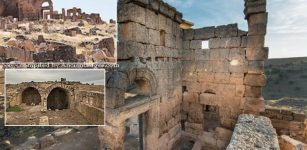 1,800-Year-Old Entrance To Turkey’s Zerzevan Castle Found Among The Ruins
Archaeology | Aug 15, 2020
1,800-Year-Old Entrance To Turkey’s Zerzevan Castle Found Among The Ruins
Archaeology | Aug 15, 2020 -
 Impressive Pyramid Of Kukulkan (El Castillo’) At Chichen Itza
Civilizations | Feb 7, 2017
Impressive Pyramid Of Kukulkan (El Castillo’) At Chichen Itza
Civilizations | Feb 7, 2017 -
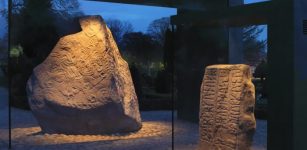 3D Scans Of Runestones Reveal The Power Of Viking Queen Thyra
Archaeology | Oct 13, 2023
3D Scans Of Runestones Reveal The Power Of Viking Queen Thyra
Archaeology | Oct 13, 2023 -
 Ancient Ingenious Ideas Of Transmitting Messages Over Long Distances
Ancient Technology | Jan 30, 2019
Ancient Ingenious Ideas Of Transmitting Messages Over Long Distances
Ancient Technology | Jan 30, 2019 -
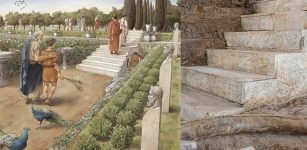 Lavish Home And Exotic Garden Of Emperor Caligula Discovered In Rome
Archaeology | Nov 19, 2020
Lavish Home And Exotic Garden Of Emperor Caligula Discovered In Rome
Archaeology | Nov 19, 2020 -
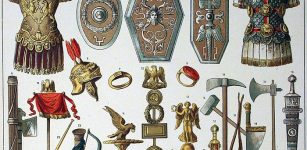 Source Of Ancient Roman Silver Was The Iberian Peninsula
Archaeology | Dec 18, 2021
Source Of Ancient Roman Silver Was The Iberian Peninsula
Archaeology | Dec 18, 2021 -
 On This Day In History: The ‘Canterbury Tales’ Read For The First Time At Richard II’s Court – On Apr 17, 1397
News | Apr 17, 2017
On This Day In History: The ‘Canterbury Tales’ Read For The First Time At Richard II’s Court – On Apr 17, 1397
News | Apr 17, 2017 -
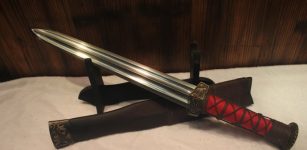 Deeper Look Into Chinese Swords Throughout The History Of The Dynasties
Featured Stories | Sep 19, 2018
Deeper Look Into Chinese Swords Throughout The History Of The Dynasties
Featured Stories | Sep 19, 2018 -
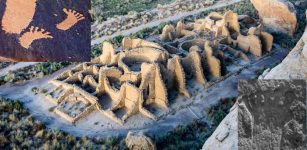 Ancient People In Chaco Canyon Who Had Six Fingers And Six Toes Were Special – Researchers Say
Archaeology | Mar 16, 2022
Ancient People In Chaco Canyon Who Had Six Fingers And Six Toes Were Special – Researchers Say
Archaeology | Mar 16, 2022 -
 Are The Strange Lawrence Brook Carvings In New Jersey A Cryptic Message?
Featured Stories | Feb 10, 2023
Are The Strange Lawrence Brook Carvings In New Jersey A Cryptic Message?
Featured Stories | Feb 10, 2023 -
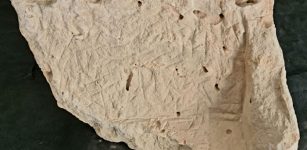 3,500-Year-Old Stone Inscribed With A Curse Against The City’s Governor Discovered In Jerusalem
Archaeology | Jul 13, 2022
3,500-Year-Old Stone Inscribed With A Curse Against The City’s Governor Discovered In Jerusalem
Archaeology | Jul 13, 2022 -
 Controversial Tunnel Plan Near Stonehenge Gets U.K. Government Approval – Shocked And Angry Opponents Will Challenge The Decision In High Court
News | Nov 13, 2020
Controversial Tunnel Plan Near Stonehenge Gets U.K. Government Approval – Shocked And Angry Opponents Will Challenge The Decision In High Court
News | Nov 13, 2020 -
 Archaeological Mystery Of Laos Megalithic Jars Continues – New Attempt To Solve The Riddle
Archaeology | Mar 12, 2021
Archaeological Mystery Of Laos Megalithic Jars Continues – New Attempt To Solve The Riddle
Archaeology | Mar 12, 2021 -
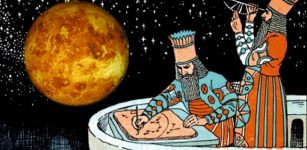 Elusive Planet Mercury As Seen Through The Eyes Of Ancient Astronomers
Archaeoastronomy | Dec 31, 2018
Elusive Planet Mercury As Seen Through The Eyes Of Ancient Astronomers
Archaeoastronomy | Dec 31, 2018 -
 Dazzling Time Capsule Of Unique Iron Age Artifacts And Celtic Roundhouses Discovered In England
Archaeology | Mar 15, 2022
Dazzling Time Capsule Of Unique Iron Age Artifacts And Celtic Roundhouses Discovered In England
Archaeology | Mar 15, 2022 -
 Early North Americans Much More Diverse Than Previously Believed
Archaeology | Jan 30, 2020
Early North Americans Much More Diverse Than Previously Believed
Archaeology | Jan 30, 2020 -
 Is A Gigantic Ancient City Hidden Underwater In The Bermuda Triangle?
Featured Stories | Jul 8, 2014
Is A Gigantic Ancient City Hidden Underwater In The Bermuda Triangle?
Featured Stories | Jul 8, 2014 -
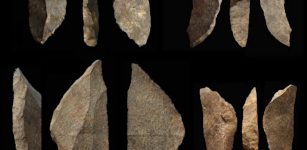 Prehistoric Swiss Army Knife Shows How Early humans Communicated
Archaeology | Jun 9, 2022
Prehistoric Swiss Army Knife Shows How Early humans Communicated
Archaeology | Jun 9, 2022 -
 Dinosaurs Were On The Up Before Asteroid Downfall – Study Finds
Archaeology | Dec 8, 2022
Dinosaurs Were On The Up Before Asteroid Downfall – Study Finds
Archaeology | Dec 8, 2022 -
 New Clues Why Neanderthals Visited La Cotte de St Brelade In Jersey 250,000 Years Ago
Archaeology | Jun 18, 2023
New Clues Why Neanderthals Visited La Cotte de St Brelade In Jersey 250,000 Years Ago
Archaeology | Jun 18, 2023


